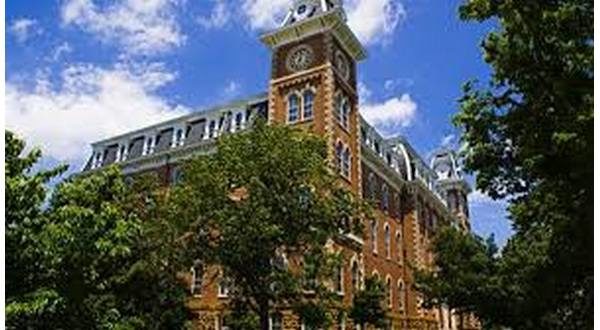
FAYETTEVILLE — The University of Arkansas, Fayetteville is in the top 20 in the nation for online programs, according to a recent Newsweek ranking.
The university ranked 20th in the nation — and earned a five-star rating — in Newsweek’s 2022 student-focused ranking of colleges and universities that offer degree programs online, according to the university. Newsweek and Statistica — a market and consumer data company — ranked 200 institutions in November based on student surveys and institutional indicators, with feedback from online learners accounting for 80% of the ranking, and 20% for institutional indicators, such as graduation data and reenrollment rates.
The fact that student feedback is weighted so heavily for this ranking makes it “particularly special,” said Cheryl Murphy, vice provost for distance education. She said the ranking is an indicator that students who take online courses at the university “are satisfied and would recommend it.”
student experience and give them the tools for success,” she said.
For example, the Online Student Liaison Office was created with seven staff members to “answer questions and help these students navigate the institution.”
Students physically on campus can easily stroll into the building when they need to ask someone a question about college, but that’s physically impossible for students learning from a distance, she said. That’s where the Online Student Liaison Office enters the picture.
students have other things going on in their lives — their average age is in the 30s, so they may be taking care of children or adults, or working — so they may need a little help with time management” and other things.
Online orientation sessions have also been added, so “they know how to function in the online environment,” as has an “online student union where they can ‘gather’ to talk to each other about classes and topics,” she said. In a physical classroom, students naturally form into study groups, but that’s more challenging online, hence the online student union, a method of “peer support, because they do need each other.”
There’s also “24/7/365 tutoring” through TutorMe and a chemistry prep course that can be a refresher for students before they take online chemistry, she said. “A lot of our students have been away from school for a while, so some of their chemistry may be rusty, but this is a reminder that gives them a leg up when the semester starts.”
The university offers 86 online degree programs and certificate and licensure plans — which can be found online at online.uark.edu — and 864 total online courses, according to the university. More than 440 students graduated in May 2022 after studying in online degree programs at the university.
Faculty members who teach online courses at the university are the same ones who teach in-person classes, Murphy said. These instructors receive “training, because it is different, as well as wraparound services and media support so they can be the best they can be.”
“We don’t have a separate organization for online; our online degrees come from the colleges on campus,” said Kay Murphy, director of communications for the UA-Fayetteville global campus. “The global campus is a support unit for the colleges — we help them put the online courses together — and you earn a degree from the University of Arkansas even if you study online.”
“It’s very important to the university that those who can’t come to campus can still earn a degree from the flagship university of our state, and more than 7,000 have earned degrees from this university over the last 10 years because we offer online degrees,” Kay Murphy added. “I have two degrees from this university, one of them online, and having that flexibility gives working people a chance to further their education.”
Enrollment continues to grow, which “we’ve anticipated,” and that’s “why we’re adding personnel and creating additional programs and supports,” she said. “Nationally, more students are going 100% online, and more colleges are offering 100% online programs, but the traditional college-age student still wants that full on-campus experience, although more and more do want the flexibility of at least some online courses.”
During the 2021-22 academic year, nearly 16,500 students took at least one online course, up 5% from the previous year, and 4,332 students were exclusively online, a 16% increase from the previous year, she said. Exclusively online students were split nearly 50/50 between undergraduate and graduate students, with 2,108 of the former and 2,224 of the latter.
WebReadyTM Powered by WireReady® NSI










